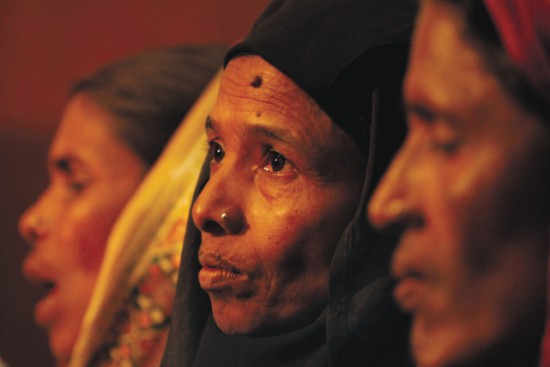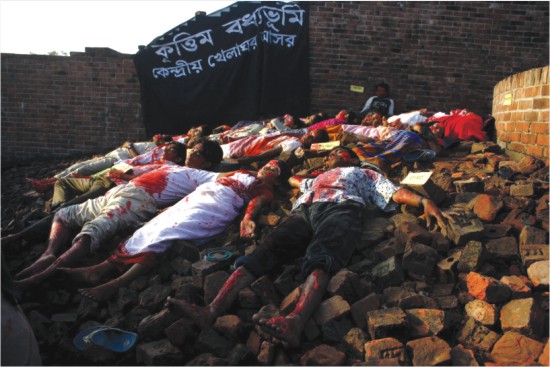
Inside
|
The Need for Justice Z. Tariq Ali highlights the common area between war crimes and minority rights
Genocide has been a part of human legacy for ages. Genocide, by definition is the selective extermination of certain sections of the population and is the cruelest way in which human rights are violated. History has not always been as fortunate to the victims as it was when a remorse stricken Emperor Ashoka accepted reprimands from a Buddhist monk after the Kalinga massacres, thereby changing his life. That in turn, changed the course of world history, in that Buddhism received one of its greatest patrons for its spread throughout the world. As we near the end of the first decade of the 21st century and still witness the bombing of schools in Gaza or the barbed wires of Guantanamo Bay, we see no reason to believe that mankind has become saner. The long list of genocides of the last century began with the not-so-publicised Armenian Genocide, in which a million or so people had perished by the time the Ottoman Rule ended with the fall of the Ottoman Empire in the First World War. This was followed by the Jewish Holocaust during the Second World War which saw the extermination of 6 million Jewish and other ethnic citizens in various European countries. Credit goes to Jewish people all over the world on two counts. They have been able to keep the western conscience in a state of shame for the last sixty years with a successful publicity campaign, and they have been relentless in their efforts to bring to justice all the perpetrators of that crime. Even as I write this paper, John Demjanjuk, a guard of a Nazi death camp in Poland is being deported from US to Germany at the age of 89 to face the trials for 29,000 murders. The flawed idea of the partitioning of India in 1947 also may have had its origins in the concept of ethnicity-specific countries that were created in the twentieth century as sequels to these two genocides. That flawed idea certainly unleashed the most mindless violence in the Punjab although it is not labelled as genocide because both sides demonstrated equal barbarity in unraveling the monster that nestled within them. The Punjab violence continues to traumatise sufferers and their families alike, even three generations later. It was partly this hate-psychosis generated by the partition-violence which must have inured the senses of the Pakistani army enough to be able to unleash the mindless killing of unarmed civilians throughout Bangladesh in 1971. Roughly 10,000 people lost their lives every day during the 9 months of the Pakistani rampage. Another feature that the Bangladesh genocide shares with the Holocaust and the Cambodian Genocide is that it was not a ragtag bunch of hooligans on a rampage, but a fully professional and well-trained army, well versed in the stipulations of the Geneva Convention, which carried out the atrocities. This aspect also brings to question whether army training exercises should be mandated to include sensitivity studies on how to deal with civilians. We would also like to propose an argument here that in the modern methods of war, thousands of soldiers are reduced to blips on computer screens of the army with superior technology, (remember the Iraq War) ready to be wiped out at the press of a button. The legality of such unequal wars needs to be brought under scrutiny by human rights activists throughout the world, and needs to be debated afresh in the appropriate world bodies. The Geneva Convention should also be suitably amended in the light of these discussions. The Nanjing Massacres and the Korean "Comfort Women" should also have found its due place in the genocide reference list but that is hardly the case. The Cambodian genocide, which closely followed the heels of the Bangladesh Genocide, resulted in the death of roughly 1.7 million people due to the actions of a well trained army between 1977 and '78. The proceedings of the Cambodia Trial could only be started in 1997 chiefly because of cold-war compulsions. The Rwanda killings of 1994, in which roughly 1 million Tutsis were eliminated as also the ethnic cleansing of the Muslim population in Bosnia and Herzegovina is evidence enough that the bestial instincts in humankind are still alive, ready to conflagrate with the smallest spark. It is a matter of regret that the Genocide in Bangladesh, in which 3 million people were killed and 280,000 women raped, has not been listed as Genocide. Even human rights abuses in Haiti have found a place in the Genocide references, but because the US was opposed to Bangladesh during the Liberation War, the systematic looting and torching of millions of homesteads and the methodical killing by the army of a significant portion of the minority population who were unable to cross the borders into India, was obviously not good enough in the skewered justice perceptions of the western world to make it into the genocide reference list. Therefore one of the first things that human rights activists from all over the world and the Bengalis themselves owe to history is to campaign for putting Bangladesh on the genocide map. Development of world-consciousness about war crimes The Tokyo and the Nuremburg Trials in particular, which were conducted immediately after the Second World War, and which for the first time articulated the idea of "Crimes against Humanity," played a role in raising the awareness levels of the world to such an extent that they contributed to the passing of the Universal Declaration of Human Rights and the Convention on the Prevention and Punishment of the Crime of Genocide in 1948. The definition of crimes against humanity has been significantly broadened over the years, the latest inclusion being that of "forced disappearance." Over the past 50 years, the UDHR has also triggered the enactment of a number of other human rights instruments, such as the 1960 Decolonisation Declaration, the 1975 Helsinki Accord, the 1979 Convention on Women's Rights, the 1989 Convention on Children's Rights etc. The mere fact that these two Declarations were readily available, for one to draw references from, must also have facilitated the quick response by the world community to the recent acts of genocides in various parts of the world as in the case of the Rwanda (ICTR, 1994), Former Yugoslavia (ICT, Former Yugoslavia, 1993) and the Khmer Rouge Trials (1997). As a result of these trials the need was felt for a permanent body and so the International Criminal Court (Rome Statute) was formed in 1998. Bangladesh was lucky to have had a very competently formulated "The International Crimes (Tribunal) Act", which was passed by its Parliament in 1973. But it stopped there. The oil crisis of 1973 gave rise to a redistribution of power equations, especially in the middle-east, and a war ravaged Bangladesh could scarcely afford to ignore the risks of political and economic sanctions which would have been imposed had they proceeded with war-crimes trials. The ground realities of the oil crisis also caused a very cruelly enacted change in 1975 in which the father of the nation, Sheikh Mujibur Rahman was killed and the philosophical tenor of the government changed. The trials have therefore languished for the last 30 years. Those ground realities still exist and although Bangladesh has taken some concrete steps in the last couple of months towards holding the trials it remains to be seen whether international intrigues will be able to distort the outcome. The need for justice The Liberation War Museum has taken both an activist and an academic role in the effort to raise world consciousness regarding this long neglected and delayed issue in both the national and international forums. The First International Genocide Conference (a few books on the proceedings of that conference are available here) was held last year in March and the second in July, 2009. In recent years we have also witnessed the inclusion of the Bangladesh genocide in the curricula of academic institutions around the world and the Museum has provided resources and documentation in these efforts.
The world has so far dealt with genocide with kid-gloves. Doing that is tantamount to 'domesticating' genocide, and would ultimately trigger further genocides all over the world due to the fact that this potential evil lies dormant in all societies. And we have seen that it is not conquering hoards from the outside which have caused the maximum damage but people who are ethnically and geographically, the closest to each other, who cause most of the violence (Armenia, Tutsis, Darfur, Cambodia, Bosnia, Punjab, etc.) One must not try to rationalise the causes of genocide or study the reasons behind it. Rather, the immediate reaction to any genocide, proved or not, is to take steps on an international level to nip it in the bud. An international peacekeeping force, under UN command, with adequate diplomatic and interventional muscle needs to be assembled. If the politicians want to research and rationalise genocide, they may do so only after the violence has been quelled. The immediate and mandatory response should be international intervention. The world conscience needs to awaken to the necessity for taking steps to actively protect the rights of minorities under an equally powerful UN body like the one mentioned above (or by the same body). I would suggest that any ethnic or religious group, which is less than 20% of the population of a country, should enjoy special rights and protections under the Constitution of the country enforceable through some sort of affirmative action program. Z. Tariq Ali is a social worker and an Adviser to the Liberation War Museum. |

